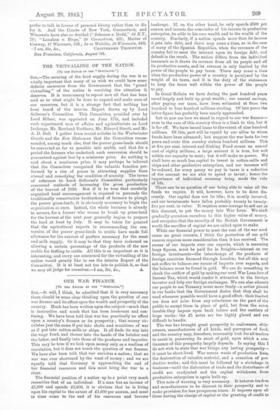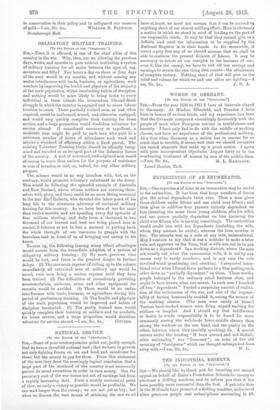OUR WAR FINANCE. Pro TRU EDITOR Or TEL "ErsoTATon."1 SIR,—It
will, I think, be admitted that it is very necessary there should be some clear thinking upon the question of our war finance and its effect upon the wealth and prosperity of the country. Much has been written upon the subject—much that is instructive and much that has been irrelevant and con- fusing. We have been told that war has practically no effect upon a country's finance or its prosperity ; that money cir- culates just the same if put into shells and munitions of war as if put into cotton-mills or ships. It all finds its way into the wage fund, and thence into the hands of the butcher and the baker, and finally into those of the producer and importer. This may be true if we look upon money only as a medium of circulation, but it does not touch the question of war finance. We have also been told that war enriches a nation; that no war was ever shortened by the want of money ; and we are equally told that Germany is approaching the end of her financial resources and this must bring the war to a close.
The financial position of a nation up to a point very much resembles that of an individual. If a man has an income of £1,000 and spends £2,000, it is obvious that he is living upon his capital to the extent of £1,000 per annum, and must in time come 'to the end of his resources and become bankrupt. If, on the other band, he only spends £500 per annum and invests the remainder of his income in productive enterprise, he adds to his own wealth and to the wealth of the country. Similarly, if a nation spends more than its income it gets into debt, and there may come a time, as in the case of many of the Spanish Republics, when the revenues of the country fail to meet the interest upon its foreign debt, and default is the result. The nation differs from the individual inasmuch as it draws its revenue from all its people and all its productive assets, and its revenue is only limited by the power of the people to pay taxes. There may come a time when the productive power of a country is paralysed by the weight of its taxes, and it is the duty of the statesman to keep the taxes well within the power of the people to pay.
In Great Britain we have during the past hundred years saved largely and built up great wealth ; our annual savings, after paying our taxes, have been estimated at from two hundred to four hundred millions sterling. Of late years the latter figure has probably been nearly approached.
Let us now see how we stand in regard to our war finance-'- even in the case of this country there is a limit to this, but it is far off. We have issued loans to the extent of nine hundred millions. Of this, part will be repaid by our allies to whom funds have been advanced; but suppose the war lasts for two years and costa this country sixteen hundred millions. This at five per cent. interest and Sinking Fund means an annual cost of eighty millions, a large amount it is true, but well within our capacity to meet ; but it will make us poorer. We shall have so much less capital to invest in cotton-mills and ships and other productive enterprises, and our incomes will be reduced, for every penny we pay in taxes is a reduction of the amount we are able to spend or invest ; hence the importance of individual economy being made the rule of life.
There can be no question of our being able to raise all the funds we require. It will, however, have to be done dis- creetly. Our capital does not lie idle; it is mostly invested, and our investments have fallen probably twenty to twenty- five per cent, in value. It requires some courage to sell out at this discount, to put the money into War Loan. We shall gradually accustom ourselves to this higher value of money, and recognize that the security of the British Government is worth the sacrifice of capital we are called upon to make.
While our financial power to meet the cost of the war need cause no great concern, I think the protection of our gold reserve requires more consideration than it has received. The excess of our imports over our exports, which is assuming large figures, must be paid for in freights—interest on our foreign investments—the interchange of the products of foreign countries financed through London; but all this may not suffice to balance our excess of imports over exports, and the balance must be found in gold. We can do something to check the outflow of gold by making our next War Loan free of Income Tax, which would render it attractive to the foreign investor and help our foreign exchanges. We can also educate our people to use Treasury notes more freely—a notice placed in our banks that the Government desire that they shall be used whenever possible would have a good effect : their limited use does not arise from any reluctance on the part of the public to accept them in place of gold, but from the extra trouble they impose upon bank tellers and the cashiers of large works: the 21 notes are too highly glazed and are difficult to handle.
The war has brought great prosperity to coalowners, ship- owners, manufacturers of all kinds, and purveyors of food, and the country may, therefore, reasonably look for all traders to assist in preserving its stock of gold, upon which a con- tinuance of this prosperity largely depends. In saying this I do not wish to state that war brings any lasting prosperity— it must be short-lived. War means waste of productive lives, the destruction of valuable material, and a cessation of pro- ductive works; and this must be followed by a shrinkage in business—until the dislocation of trade and the disturbance of credit are readjusted and the capital withdrawn from productive enterprises is again built up. This note of warning is very necessary. It behoves traders and manufacturers to be discreet in their prosperity and to make provision for less prosperous times. it imposes upon all those having the charge of capital or the granting of credit to be conservative in their policy and to safeguard our reserves



































 Previous page
Previous page